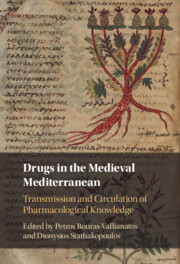Book contents
- Drugs in the Medieval Mediterranean
- Drugs in the Medieval Mediterranean
- Copyright page
- Contents
- Figures
- Tables
- Contributors
- Acknowledgements
- Note to the Reader
- Medieval Mediterranean Pharmacology
- Part I Transmission of Pharmacological Knowledge
- Part II The Borders of Pharmacology
- Chapter 7 Making Magic Happen
- Chapter 8 Remedies or Superstitions
- Chapter 9 When the Doctor Is Not Around
- Chapter 10 Digestive Syrups and After-Dinner Drinks
- Chapter 11 Late Byzantine Alchemical Recipe Books
- Chapter 12 Making Connections between the Medical Properties of Stones and Philosophy in the Work of Albertus Magnus
- Chapter 13 Healing Gifts
- Index
- References
Chapter 8 - Remedies or Superstitions
Maimonides on Mishnah Shabbat 6:10
from Part II - The Borders of Pharmacology
Published online by Cambridge University Press: 19 October 2023
- Drugs in the Medieval Mediterranean
- Drugs in the Medieval Mediterranean
- Copyright page
- Contents
- Figures
- Tables
- Contributors
- Acknowledgements
- Note to the Reader
- Medieval Mediterranean Pharmacology
- Part I Transmission of Pharmacological Knowledge
- Part II The Borders of Pharmacology
- Chapter 7 Making Magic Happen
- Chapter 8 Remedies or Superstitions
- Chapter 9 When the Doctor Is Not Around
- Chapter 10 Digestive Syrups and After-Dinner Drinks
- Chapter 11 Late Byzantine Alchemical Recipe Books
- Chapter 12 Making Connections between the Medical Properties of Stones and Philosophy in the Work of Albertus Magnus
- Chapter 13 Healing Gifts
- Index
- References
Summary
In The Guide to the Perplexed III.37, Moses Maimonides attacks pagan ‘medical’ practices which give a sheen of efficacy but are ultimately dependent on magic and astrology. Nonetheless, he allows certain exceptions found in late antique rabbinic literature which have been proven through experience – even if they are not ‘prescribed by reason’. His preference for empiricism over principles or causes is noteworthy. In this, Maimonides follows others such as al-Ghazālī who prized Galen’s medical empiricism over medical theory. In this chapter I examine these exceptional cases in light of the literature of antiquity in order to discuss their efficacy. I also reveal how Maimonides’ begrudging acceptance of experience over theory also underpins his ‘proof’ of the creation of the world – which also ultimately turns to Galen. Thus, I reflect on the importance of Maimonides’ loyalty to Galen’s experimental method for both physics and metaphysics, showing methodological continuities across different domains.
Keywords
- Type
- Chapter
- Information
- Drugs in the Medieval MediterraneanTransmission and Circulation of Pharmacological Knowledge, pp. 277 - 290Publisher: Cambridge University PressPrint publication year: 2023

